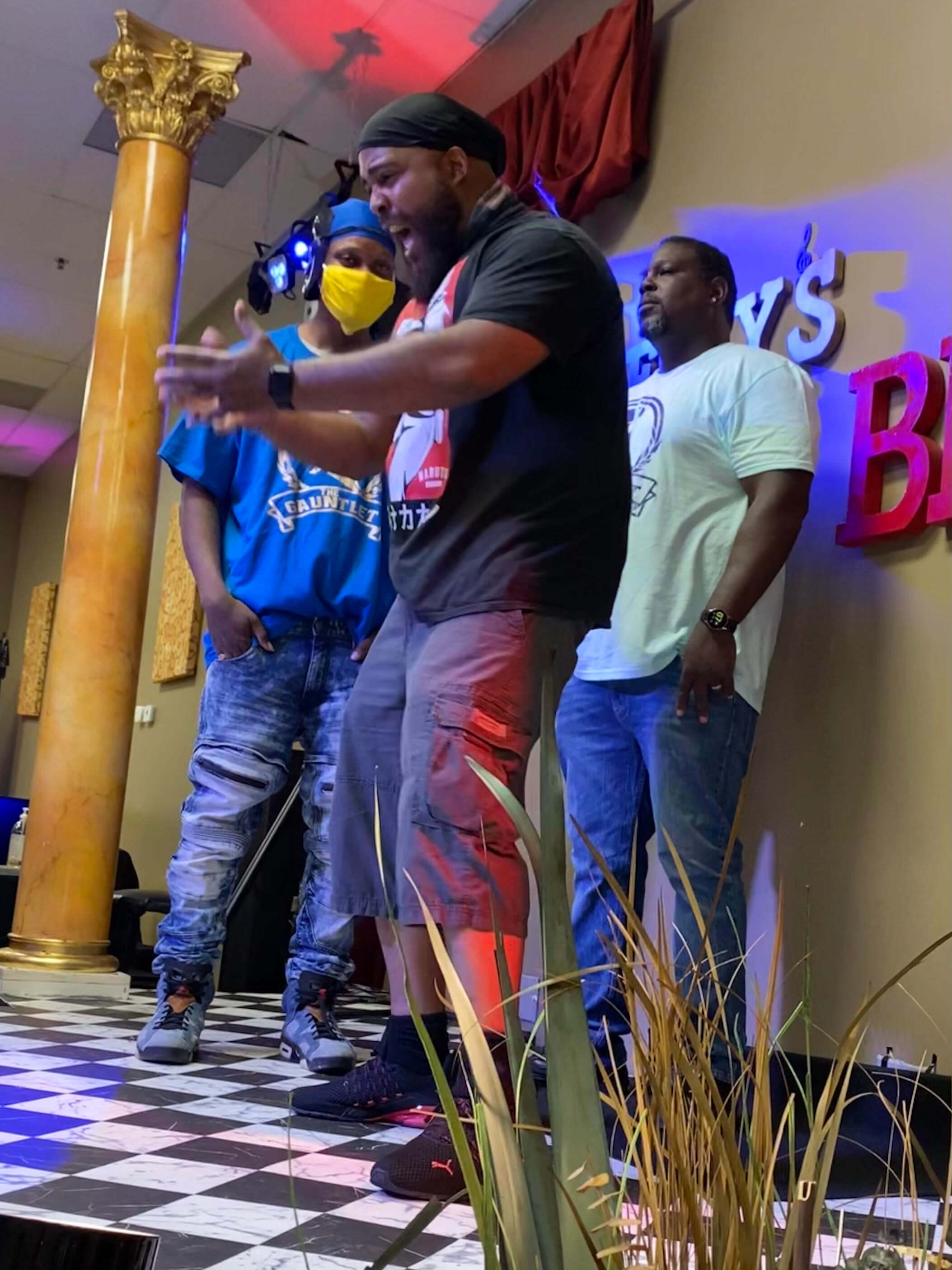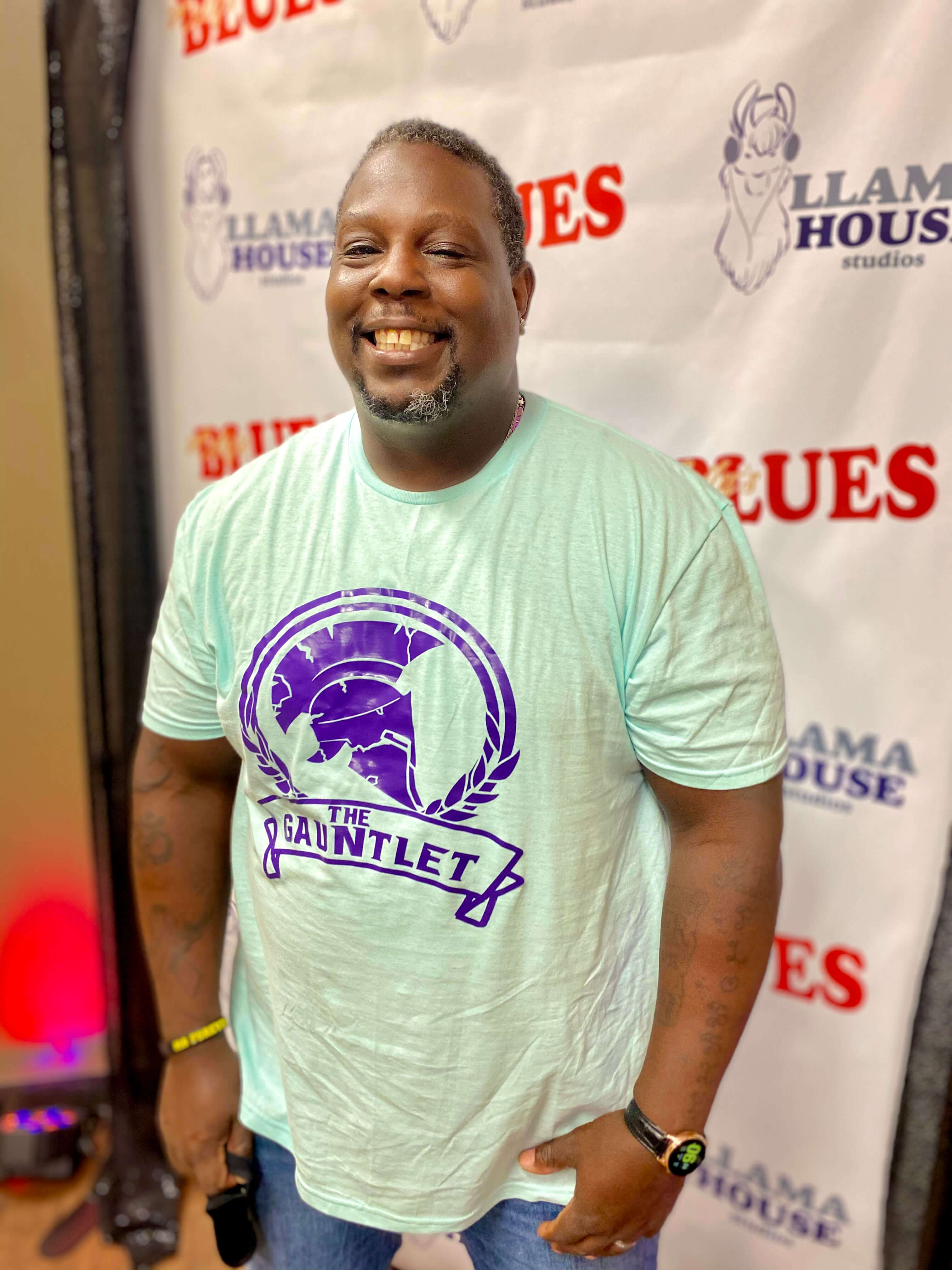
The Gauntlet rap battle is in session.
Written by Eric Sperrazza
It was 4:30 pm on a Sunday and I was driving to my first rap battle show, Concrete Jungle, for the promotion, The Gauntlet, in Turnersville, New Jersey. As I arrived at the address on the invitation, the expectation of a dank, forgotten warehouse straight from the imagery of the movie, 8 Mile, quickly melted away.
What I actually pulled up to was a gorgeous, boutique venue in an unassuming, strip mall called Miss Ceily’s Blues. As I walked into the air-conditioned and perfectly decorated blues club, I immediately felt all my reservations and expectations melt away into this warm and welcoming environment.
Enter the Ringmaster of the Concrete Jungle show, and owner of The Gauntlet promotion, LaCarr “Dreama” Hamilton. I first met Hamilton as an aspiring rapper in the Philadelphia circuit in 2005.
Hamilton was busy performing, as well as constantly buying time in the recording studio to keep content ubiquitous and fresh. These days, Hamilton is busy looking to help the next generation of talent gain exposure with a platform he is all-too-familiar with… in a rap battle league.

LaCarr “Dreama” Hamilton
Knee-deep in the cool, quiet, and calm, before the inevitable lyrical storm, I had a chance to speak to Hamilton about when, exactly, “Dreama” ceased to chase the proverbial dragon of stardom and where Hamilton began to usher in the musical wunderkinds of tomorrow.
To which he said, “2010 was the year that I realized I was going about things the wrong way. I had absolutely no business strategy. I was under the impression that people would just like my music and support me and my movement based on that. I was left emotionally scarred having to come to grips with the fact that that was not how things worked! I also came to realize that there were so many artists like myself in the same position of having a skewed expectation of success. I knew nothing about marketing and the only way to benefit from my craft is to learn what goes on behind the curtain, so to speak. So, I studied everything I could find and started building my own brand to help others be showcased and marketed in a new way.”
So, focusing his energy in the Battle Leagues aspect of the rap game (an aspect as old as hip hop, itself, mind you), Hamilton is able to zero in his energy into a medium that allows for artists to be showcased doing acapella poems and bring those talents to mainstream levels never thought possible.
“I hope being a performer and traveling, myself, helped me network,” Hamilton said. “I have been using those connections to invite as many artists as possible to join this new platform.”
And connect, Hamilton certainly has, and he is not alone! Rap battler and fellow promoter, Devaleano, was on hand to discuss how this type of ingenuity is expanding in the rap performance circles.
“Dreama and I connected a few months ago. We have the same mindset; same motivations. He has his league and I have a league, as well. We both help battle rappers so it only made sense to come out and support his card tonight. We mesh well. Myself and my team realized we needed to do something. So we reached out to local promoters and sponsors and launched Gorilla Warzone Battlegrounds. Now we (LaCarr and I) can work together to bring up even more people with more avenues to showcase.”
Devaleano was hoping to show off his surgeon-like precision against someone at Concrete Jungle but, unfortunately, he did not get his wish. His potential opponent could not make the event. That did not stop him from helping out with the night.

Devaleano wasn’t the only one that came around scouting the talent and hoping there might be a shot to hit the stage. Famed Philly Rap Battle Tag Team Champions, King Blizzy and Inferno Dash, The Inferno Kings, came with championship belts in hand. I couldn’t help but ask The Inferno Kings about their belts and the subsequent connection to Dreama.
King Blizzy responded by saying, “We were the first tag team champions of a battle league in Philly! LaCarr has been around, hands-on, with the various factions of rap battle leagues, forever. He was always around and we were always communicating. LaCarr was always working to help battle rappers shine, you know? I respect and like working with LaCarr because he is passionate about our artistry. He’s been instrumental in helping us get our bars off.”
It’s not just battle rap shows Blizzy and Dash are eyeing. They have multiple projects and music on multiple platforms. Inferno Dash even made a point of saying, “Music is what we do. I’m not just involved with hip hop; I am an instrumental musician and play different venues with different bands. I don’t know where this is all gonna go, but whatever opportunities arise to go to the next level, I’m open to it. I recognize that I am a brand… We ARE a brand.”
Amidst the merchandise flying off the shelf and the excitement in the air, the night seemed to fly by. The respect and sheer brotherhood that the artists share for each other is evident to the naked eye. Like any other sport, these competitors are gracious and humble before and after the proverbial whistle. But on the stage? They each take aim at each other like wordsmith assassins in front of a live studio audience and nothing is off-limits to win the crowd and trip up their opponents.
Nowhere was that more evident than the main event of the night, God Body Blue versus Uncle Nate.
God Body Blue, a Memphis native started off virally taking challenges, online, and filming his triumphs. “To me, battle-rapping is like chess. It’s strategy and timing. Or even more so like boxing, in that, you are trying to formulate as many strikes as possible in the time you have; to intricately put your shots together,” he was recorded saying about his humble beginnings and his frame of mind.
Uncle Nate, on the other hand, came into the rap battle circuit under a different moniker. He came in under the firm belief that changing up his name and style would give him an edge, and that it would be harder for his opponents to scout him online. However, it didn’t stop him from scouting God Body Blue before the show.
“I’ve seen some of his battles just to check his level of skill,” said Uncle Nate of God Body Blue. “It ain’t there. The skill ain’t there. It ain’t gonna be enough. I’m here to support LaCarr because I don’t think God Body is on my level.”
But bravado aside, these two hungry artists hit the stage for the final battle on the card to a sea of cheers and support from all in attendance. Uncle Nate came out hard, taking shots at God Body‘s country beginnings, as well as publicly acknowledging his presence was strictly to support the league and not to provide any come-ups on the ladder of battle-rap success to God Body Blue. But when God Body had his chance to fire back, it was explosive, ruckus-filled and fraught with imagery of street justice. Uncle Nate couldn’t help but smile and shake his hand after God Body‘s time was up.

Afterward, Uncle Nate made a point of finding me and telling me he wanted to amend his statement that God Body Blue wasn’t on his level. He admitted he was shocked and impressed with him. To which he found God Body and embraced him again, in front of me, giving him the credit due for rising to the occasion.
With that, and with Gauntlet merchandise in hand, I was ready to call it a night. Before I could leave, though, I had to ask LaCarr what was next for The Gauntlet. To which he replied, “Our ultimate goal is to provide quality entertainment, both live and online. To network with all willing participants in the artform and promote them to the highest level possible. So we are going to keep raising the bar, each show, to do just that. So follow us at www.facebook.com/GBLSJ and stay up on what we are doing next to support these artists!”







